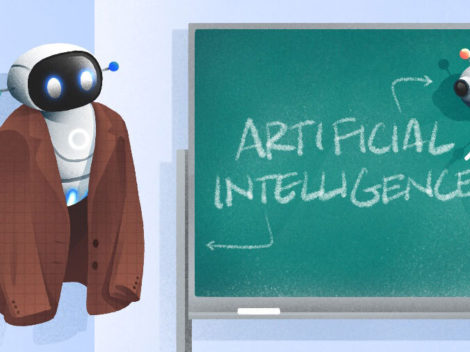Editor’s note: This is part of a series in which we interview active investors in artificial intelligence. Previous interviews were with investors at General Catalyst, Bessemer Venture Partners, Accel, Insight Partners, Index Ventures and Sequoia Capital.
Andy Harrison was at Google when the tech giant launched the Transformer machine learning model in 2017 — a massive leap forward in the way machines understand and generate human language that paved the way for the rapid rise of generative AI technologies like ChatGPT five years later.
Now Harrison is the CEO and managing partner at Section 32, a venture investment firm with ties to Google that also invests heavily in AI.

We spoke with Harrison, an ex-Googler on the tech giant’s X team, who left the company in early 2021 to lead Section 32. He was previously at Google Life Sciences as head of business and corporate development. Google Life Sciences’ mission, he said, was to take machine learning, AI, software and hardware concepts and bring them to the health care and life sciences spheres. The unit spun off into Verily.
Section 32 is also focused heavily on investing in AI, health care and life sciences.
The investment firm’s founder, Bill Maris, led Google Ventures from 2008 to 2016. The next year, he founded Section 32, which operates on the East and West coasts and manages $2.3 billion that it has raised across five funds since 2017. Its newest is a $525 million fund it closed on earlier this month.
Investment focus
Specifically, Section 32 is investing in AI in infrastructure, enterprise services, cybersecurity and areas like precision medicine and computational biology, Harrison said.
“We’ve been staying away from what we call ‘the zone of commoditization’ and trying to focus on the second- and third-order problems that we know the cloud players are not going to build,” Harrison said, speaking about the rare talent pools and abilities required to compete in AI.
“We’ve been very focused about building a portfolio that focuses on some of those applications where there should be long-term protection and a strong ability to build revenue without direct competition with the large players,” he said.
The firm has invested in large language model company Cohere and biological software company Inceptive, whose founders were among the original authors of the Transformer model.
The firm is also an investor in BigHat Biosciences. The protein therapeutics startup’s co-founder, Mark DePristo, was the head of the genomics team at Google Brain.
Section 32 has invested in gaming character generation startup Inworld AI and content creation company Metaphysic.
It also has invested in climate tech startup Phaidra and quantum computing company Sandbox AQ. Another investment, Scale AI, supports data labeling for AI, while portfolio company Gretel creates synthetic data.
In cybersecurity, Section 32 has invested in Stairwell and Endor Labs.
It’s only software
The current technology evolution is driven by the continued evolution in AI models, Harrison said.
“The storage and processing power has been getting cheaper,” he said. “The models get better, the chipsets and the processing power get cheaper, and then the storage gets cheaper. That’s created a flywheel here that’s allowed these massively trained LLMs that have caught everyone’s imagination.”
However, “in the end the stuff is just software,” he said.
Harrison said Section 32 wants to invest in AI companies that drive real ROI. “It’s expensive software because of the compute and because of the talent required. So it has to be that much better,” he said. “Or it has to do something we couldn’t previously do with software in order to drive high margins. Otherwise it’s low-margin software.”
He predicts the GPU crunch will alleviate itself in the next 12 to 18 months and the costs of the models will come down.
The Transformer model
At Google, Harrison saw AI evolve from the Transformer approach, then become neural networks and convolutional neural networks and other approaches. Now it’s large language models and generative approaches, he said.
“A lot of this comes from the L — the language team, the translation team at Google back in the day,” said Harrison. They had built a model for English to Spanish and then a model for Spanish to French. This raised the thought of building a meta model to go from any language to another language, and that led to developments that led to the Transformer.
Some of the earliest uses of the Transformer model at Google was predictive text in Gmail and content moderation at YouTube.
“We still call them large language models, even though language is sort of a misnomer at this point,” he said.
And AlphaFold
DeepMind, part of Google, was the originator of AlphaFold, a program that mapped the 3D structure of proteins in the human body to help scientists understand how they work, which is crucial for understanding diseases and drug development.
AlphaFold “created a meta technique to take any protein and figure out its conformational structure based on the ones that it trained on,” Harrison said.
In health care and computational biology, Section 32 sees AI applications for drug discovery and molecular engineering.
For example, we now have the ability to create molecules that have the effect we want, with lower toxicity, or better stability, or higher tissue specificity, or higher efficacy, he said.
“A lot of those tools and techniques are very new,” Harrison said. “But they’re showing pretty incredible promises that relate to speeding up the process, saving people time and money, and increasing the odds of success — which is the most important thing for humans.”
Related Crunchbase Pro query
Further reading:
- The Four Developments Propelling AI Forward: A Conversation With General Catalyst’s Deep Nishar
- A Bessemer Partner On What’s Driving The Firm’s Billion-Dollar Bet On AI
- Accel’s AI Investments Keep The Focus On Applications And Tooling
- Insight Partners Has Invested More Than $4B Into AI. What’s Next?
- Here’s How Index Ventures Is Investing In An Era Where ‘Every Company Will Have AI’
- Inside Sequoia Capital’s Growing AI Portfolio
Illustration: Dom Guzman
Search less. Close more.
Grow your revenue with all-in-one prospecting solutions powered by the leader in private-company data.

Stay up to date with recent funding rounds, acquisitions, and more with the Crunchbase Daily.


![Illustration of toast with IPO toasted in. [Dom Guzman]](https://news.crunchbase.com/wp-content/uploads/Forecast-IPO-470x352.jpg)


![Illustration of toast with Dev toasted in. [Dom Guzman]](https://news.crunchbase.com/wp-content/uploads/Forecast-dev-470x352.jpg)





67.1K Followers